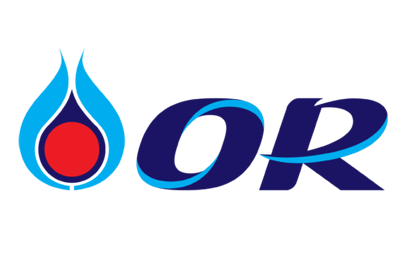
Importance
Air is a fundamental element for all living beings. Currently, air pollution has become an ongoing issue that impacts both physical and mental health, as well as causing damage to property and human well-being. Therefore, OR recognizes the importance of managing air pollution caused by its operations. The company has implemented measures to reduce and treat pollutants emission which released into the atmosphere. This is to minimize potential impacts on people and living organisms, especially OR employees and stakeholders in the surrounding areas.
2024 Targets

Management Approach
Air Pollution
OR emphasizes pollution control in compliance with legal requirements to prevent negative impacts from pollution caused by its operations. The main type of pollutant generated by OR’s activities is Volatile Organic Compounds (VOCs), which are produced during various activities related to fuel storage, transportation, and trading. Therefore, OR has established a VOC inventory to monitor emissions from activities at petroleum terminals, oil depots, LPG Depots, PTT Stations, and LPG cylinder refurbishing plants. This inventory is updated annually to ensure continuous monitoring of VOC volatilization in the areas. The data is then analyzed to develop systems and design equipment to reduce VOC volatilization into the environment. Additionally, OR has demonstrated operational performance that aligns with the PTT Group’s target of limiting VOCs emissions to no greater than 82 tons per million barrels of crude oil equivalent. Furthermore, OR achieved VOC emission targets across petroleum terminals, oil depots, LPG depots, aviation depots, LPG cylinder refurbishing plants, Company owned Company Operated (COCO) petrol stations, and Café Amazon’s coffee roaster plant, with total VOC emissions of 8,462 tons, remaining within the organization’s targets.
Moreover, OR has established the specified feedback channels as prescribing in PTT Oil and Retail Business Public Company Limited requirement. These channels allow stakeholders to share their opinions, which are then utilized to further improve management practices in the future.
Performance
OR manages VOCs, the main air pollutant,, through various projects and activities. Initiatives undertaken include switching the fuel transfer method for tankers from top loading to bottom loading, which is a closed system and thus reduces the evaporation of fuels during transportation and discharge. Additionally, Vapor Recovery Units (VRUs) have been installed between the fuel storage tanks and tanker trucks during fuel transfers at Phra Khanong Oil Depot, Lam Luk Ka Oil Depot, Saraburi Oil Depot, Surat Thani Petroleum Terminal and Songkhla Petroleum Terminal and all PTT Stations. Furthermore, a Vapor Recovery Units (VRUs) control system has been installed at the fuel dispensers during fuel transfers into customers’ car tanks at PTT Stations. This installation is carried out at PTT Station in compliance with regulations and in sensitive community areas, such as schools, to prevent adverse impacts on the surrounding communities of PTT Stations.
In addition to the aforementioned initiatives, OR has implemented measures to enhance air pollution control to ensure that, emissions from both factories and office areas, as well as surrounding areas are complied with environmental regulations and standards. OR also controls Nitrogen Oxides (NOx), Sulfur Oxides (SOx), and Total Suspended Particulates (TSP) from its operations at the sources. For operations at LPG depots, oil depots, and petroleum terminals, OR adheres to the standards specified in Environmental Impact Assessment (EIA) reports. Moreover, OR employs advanced technologies to effectively reduce or eliminate air pollutants of factories in OASYS. The After Burner has been equipped with a Catalytic filter. This process is to re-incinerate flue gas at high temperatures, eliminating odors and smoke. Additionally, ProAir systems have been installed to treat smoke odors using a plasma system before releasing them into the atmosphere. At LPG cylinder refurbishing plants, scrubbers are equipped in the painting process to filter pollutants, and Activated Carbon Filters are installed to eliminate odors. Furthermore, OR has begun installing Regenerative Thermal Oxidizers (RTO) system, a highly efficient air pollutant removing system, to remove VOCs, such as paint fumes, odors, solvents, and biogas vapors. Moreover, to ensure consistent air quality control, OR conducts regular air quality monitoring through registered external laboratories on an annual basis.
Site map
- About
- Organization
- Career
- Oil Business
- - Retail Energy Solution
- - Commercial Business
- Retail Business
- Services
- International Business
- Business Opportunity
- Sustainability
PTT Oil and Retail Business Public Company Limited
555/2 Energy Complex Building B, 12th Floor, Vibhavadi Rangsit Rd., Chatuchak, Bangkok 10900
© 2024 OR Tel : 02 196 5959


